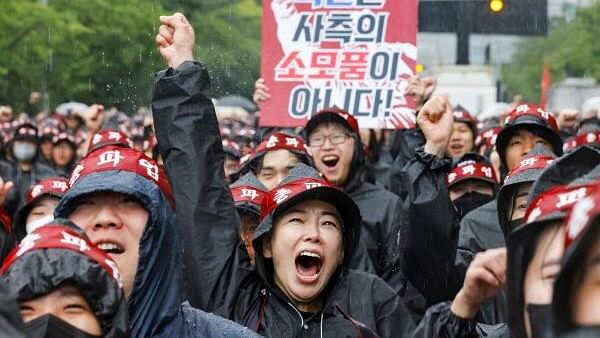
A National Samsung Electronics Union worker shouts a slogan during a general strike to disrupt production between July 8 and 10, in front of the Samsung Electronics Nano City Hwaseong Campus in Hwaseong, South Korea.
Credit: Reuters Photo
By Catherine Thorbecke
It was supposed to be a good week for Samsung Electronics Co., with attention focused on the consumer gadgets to be unveiled Wednesday at its annual summer product event. Instead, the South Korean tech titan is grappling with an unprecedented three-day strike staged by its largest union.
This work stoppage is not about artificial intelligence taking peoples’ jobs. But the biggest organized labor action in Samsung’s 55-year history portends what companies inside and outside the tech industry will soon have to confront on a global scale.
As generative artificial intelligence (AI) technology increasingly threatens to upend entire industries and sow further labor unrest, firms creating this turbulence have an outsize responsibility to work with unions and give workers a seat at the table.
How this technology effects the jobs market will likely take years, if not decades, to unfold, but there are already some workers feeling the pinch. In Silicon Valley, the very firms racing to create AI recently cut hundreds of thousands of jobs at the same time as company leaders doubled down on multi-billion-dollar investments into it.
Beyond the tech sector, the threat of AI to peoples’ livelihoods brought Hollywood production to a standstill last year as actors and writers went on a high-profile strike.
It’s not unheard of for tech companies to team up with labor unions. Industry leader Microsoft Corp. announced late last year that it was forming a historic alliance with a coalition of 60 unions to discuss how AI will impact workers.
It’s a rare example of a tech giant showing foresight and responsibility into how the products it’s creating could impact real people’s employment prospects.
At Samsung, rank-and-file chip assembly line workers are also now seeing the AI boom make their company richer, and are seeking a clearer method of tying bonus payments to operating profits, among other demands.
Samsung on last Friday posted a 15-fold increase in profits, buoyed by a rebound in demand for memory chips for data centers and AI development.
(These rosy earnings come after a difficult last year for its memory chip division.)
The work stoppage at Samsung could not come at a more consequential time for the company: The one-time leader lags domestic rival SK Hynix Inc. in making high-bandwidth memory chips that can be used for AI.
While SK Hynix has benefited from being the main supplier of these semiconductors to AI leader Nvidia Corp., Samsung has yet to get its own HBM chips to pass Nvidia’s qualification checks, and it cannot afford any missteps. SK Hynix shares have rallied more than 60 per cent since the beginning of the year, while Samsung stock is up roughly 10 per cent.
Some union representatives at Samsung have criticized the company for failing to get ahead of the high-end memory chip demand. These feelings of betrayal also underscore the love-hate relationship many Koreans have with their chaebol, or large corporations.
Within Asia’s fourth-largest economy, those employed at chaebol tend to receive higher pay and benefits than other workers. Many Koreans are also very patriotic and proud of how companies like Samsung and SK Hynix have succeeded globally in the tech sector.
Even union workers may not want to put those so closely tied to their nation’s economic strength at risk.
Times are changing fast, and businesses need to adapt. In what would have seemed impossible just a few years ago — Samsung took a hardline industrial approach for most of its history and only in 2020 said it would respect workers’ rights to organise — the union held a strike and is seeking an additional annual paid day off, changes to the bonus system, and other improvements.
Samsung said on Monday that the strike has had no impact on chip output, and markets have so far shrugged off any potential business disruption. But the union is threatening further action later this month if demands are not met, and the optics of thousands of workers rallying amid a monsoon downpour are not great for the country’s wealthiest corporation.
Organised labor movements tend to inspire each other, and the Samsung strike could spur similar actions across the tech sector in Asia and beyond.
The company now has a unique opportunity to show global leadership. It can start by working with its own employees as it races to cash in on the AI boom and give the union a proper seat at the table.
Developing this relationship now can help empower its workforce and catch up to competition. And as AI continues to reshape the global labor market, other firms will need to do the same.